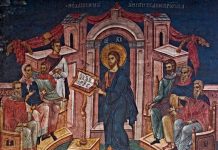MANY PASSAGES in Scripture, both the Old and the New Testaments, are disconcertingly violent, as in today’s Gospel:
Nation will rise against nation, and kingdom against kingdom; there will be great earthquakes, and in various places famines and pestilences; and there will be terrors and great signs from heaven.
Parallels to this text occur in the Old Testament, as in the first reading from the prophet Malachi: “See, the day is coming, burning like an oven, when all the arrogant and all evildoers will be stubble; the day that comes shall burn them up.” And elsewhere:
The day of the Lord is near in the valley of decision. The sun and the moon are darkened, and the stars withdraw their shining. And the Lord roars from Zion, and utters his voice from Jerusalem, and the heavens and the earth shake.
Similarly, in the Apocalypse we read:
When he opened the sixth seal, I looked, and behold, there was a great earthquake; and the sun became black as sackcloth, the full moon became like blood, and the stars of the sky fell to the earth as the fig tree sheds its winter fruit when shaken by a gale; the sky vanished like a scroll that is rolled up, and every mountain and island was removed from its place.
It is beneficial to examine the origins of this genre in writings of ancient Israel. There are two elements in its history that came together to form what we know as apocalyptic literature: first, the splendid promises about a future kingdom that would triumph over Israel’s enemies and then the reality of the actual history of the chosen people, which was a sad catalogue of repeated defeat, ruin and exile. Time and time again the hopes of the nation, centred on a Moses, a Samson, a David, had been frustrated by subsequent events. The faith of Israel in the Lord God could not be broken, but they had to recognize that no human agent would be able to realize its glorious destiny. Hence, they concluded that God himself would act so as to establish, once and for all, a new Davidic kingdom. This unmediated eruption of God into human history could not but be cataclysmic—apocalyptic—as dramatic in its way as creation itself.
But, if creation exhibited God’s power and providence, the new divine act would manifest his judgement on human behaviour, that is to say God would intervene in person to punish the sinner and reward the just. For the biblical writers, an upheaval in nature was a necessary element of the appearance of God, whether vengeful or beneficent. Think of the thunder and lightning that attended Moses when he climbed Mount Sinai; or the darkness and the earthquake that accompanied the death of Jesus on the cross. A parallel can be found in the use that playwrights make of what they call “sympathetic nature,” as in Macbeth when Shakespeare describes the country in turmoil after the murder of King Duncan:
The night has been unruly: where we lay,
our chimneys were blown down; . . . the obscure bird
clamour’d the livelong night: some say, the earth
was feverous and did shake.
In a surprising but all the same in a real way, these prophecies have come true, for in Jesus Christ God has intervened in person to judge the world by rewarding virtue and punishing vice. First, regarding the righteous: “The word was made flesh and dwelt among us. . . . to all who received him, who believed in his name, he gave power to become children of God.” And then, the unrighteous: “He who rejects me and does not receive my sayings has a judge; the word that I have spoken will be his judge on the last day.” One could encapsulate the apocalyptic tradition—and indeed the entire Bible—by noting that it is a moral treatise in which virtue is rewarded and vice is punished. The depictions of nature—turbulent or in repose—are clearly symbolic, corresponding to man’s internal orientation towards or away from God, which can be as dramatic as any upheaval in nature: “O the mind, mind has mountains; cliffs of fall/Frightful, sheer, no-man-fathomed.”
And so, whatever may be the actual physical events that accompany the second coming of Jesus, we know that they will be illustrative of the moral status of men and women. For the righteous, we have the promise of a world renewed:
Surely his salvation is at hand for those who fear him, that glory may dwell in our land. Steadfast love and faithfulness will meet; righteousness and peace will kiss each other. Faithfulness will spring up from the ground, and righteousness will look down from the sky.
And for the unrighteous? That we may well leave in the hands of God.










